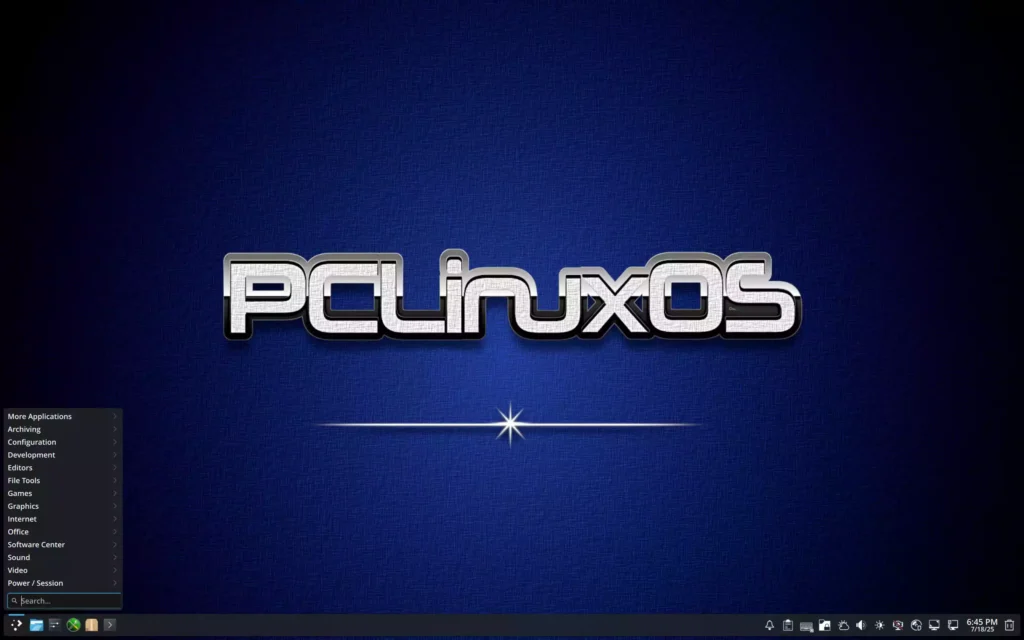
PCLinuxOS 2025.07: A Fresh Look at a Veteran Linux Distribution
Introduction
In the ever-evolving world of Linux distributions, few have stood the test of time like PCLinuxOS . Known for its user-friendly interface, stability, and rolling release philosophy, PCLinuxOS has quietly remained a favorite among Linux veterans and newcomers alike. With the release of PCLinuxOS 2025.07 , the project has taken another confident step forward—combining modern features with the simplicity and reliability that have long defined its identity.
This blog post will explore the latest release of PCLinuxOS, including its key features, improvements, performance enhancements, and how it stacks up against other popular distributions in 2025. Whether you’re a long-time Linux user or someone considering a switch, this in-depth look at PCLinuxOS 2025.07 will help you understand why this distribution continues to matter.
What is PCLinuxOS?
PCLinuxOS is a community-driven Linux distribution based on RPM packages and derived from Mandriva Linux . It was created in 2003 by Bill Reynolds (also known as “Texstar”) and has since evolved into a mature, stable operating system that emphasizes ease of use, out-of-the-box functionality, and a commitment to staying lightweight and fast.
Unlike many mainstream distributions that follow a fixed release cycle, PCLinuxOS has traditionally followed a semi-rolling release model , meaning users receive frequent updates without the need to reinstall the OS with each new version. However, the project also releases periodic “snapshot” versions (like 2025.07) that are tested and released as stable ISOs for installation.
PCLinuxOS 2025.07: What’s New?
The PCLinuxOS 2025.07 release brings a host of updates, refinements, and under-the-hood improvements that make it one of the most polished versions to date. Here’s a breakdown of what’s new:
1. Updated Kernel and Core Components
At the heart of PCLinuxOS 2025.07 is the Linux kernel 6.10 , offering improved hardware support, better power management, and enhanced performance for both desktop and laptop systems. Alongside the kernel, core system components like systemd 255 , glibc 2.40 , and GCC 14.1 have been updated, ensuring compatibility with the latest software and hardware.
2. Modernized Desktop Environments
PCLinuxOS 2025.07 ships with a choice of four desktop environments :
- KDE Plasma 6.1
- Xfce 4.18
- LXQt 2.0
- MATE 1.28
Each environment has been carefully configured to offer a smooth experience out of the box. The KDE edition, in particular, benefits from the latest Plasma updates, including improved Wayland support, smoother animations, and better integration with Qt-based applications.
The lightweight editions (Xfce, LXQt, and MATE) have been optimized for older hardware, making PCLinuxOS 2025.07 a versatile option for both modern and legacy systems.
3. Enhanced Software Management with RPM and APT-RPM
Despite being an RPM-based distribution, PCLinuxOS uses a customized version of APT-RPM , a package manager inspired by Debian’s APT. This hybrid approach provides users with the benefits of RPM packaging while offering a familiar and powerful command-line interface for managing software.
The PCLinuxOS Control Center has also been updated, offering a graphical interface for installing, removing, and updating software. It integrates seamlessly with the system’s repositories, which now include thousands of applications ranging from productivity tools to multimedia codecs.
4. Improved Hardware Detection and Driver Support
One of the standout features of PCLinuxOS has always been its excellent hardware detection. With 2025.07, this capability has been further enhanced with updated firmware packages and driver support for:
- NVIDIA GPUs (version 535 series)
- AMDGPU and Intel graphics
- Wi-Fi 6E and Bluetooth 5.3 support
- USB4 and Thunderbolt 4 compatibility
This makes PCLinuxOS 2025.07 a solid choice for users who want plug-and-play functionality without the hassle of manual driver installation.
5. Security Enhancements
Security is a top priority in 2025.07. The release includes:
- SELinux and AppArmor integration (optional)
- Kernel self-protection features enabled by default
- OpenSSH 9.8 with support for modern encryption standards
- Regular security updates via the rolling release model
These features ensure that systems remain secure without compromising performance or usability.
6. Updated Applications and Software Suite
PCLinuxOS 2025.07 ships with a curated set of applications that are both functional and lightweight. Highlights include:
- LibreOffice 7.6 – A full-featured office suite
- Firefox 128 ESR – Stable and secure browsing
- Dolphin 24.04 – KDE’s powerful file manager
- Kate 24.04 – A versatile text editor
- VLC 3.0.20 – For multimedia playback
- Thunderbird 128 – Email and news client
All applications have been compiled specifically for PCLinuxOS, ensuring compatibility and performance.
Installation Experience
The installation process in PCLinuxOS 2025.07 is straightforward and user-friendly. The live ISO boots quickly and provides a full desktop environment, allowing users to test the OS before installation.
The installer , known as MCC (Mandriva Control Center) , guides users through the setup with minimal steps. Key features include:
- Automatic partitioning with support for LVM and encryption
- Easy selection of desktop environment
- Dual-boot detection for Windows systems
- Language and timezone configuration
For advanced users, manual partitioning and custom settings are available, making the installer both accessible and flexible.
Performance and Stability
PCLinuxOS has always been praised for its rock-solid stability , and 2025.07 continues this tradition. Thanks to the semi-rolling release model, users benefit from the latest software updates while maintaining system stability through careful testing and repository management.
In performance benchmarks, PCLinuxOS 2025.07 holds its own against other lightweight distributions. On older hardware (e.g., a 10-year-old laptop with 4GB RAM), the Xfce edition runs smoothly with near-instant boot times and minimal resource usage.
On modern hardware, the KDE edition shines with smooth animations, fast application launches, and efficient memory management.
Customization and Community Support
PCLinuxOS 2025.07 offers a high degree of customization , both in terms of appearance and system configuration. The KDE Plasma edition, in particular, allows for extensive customization through widgets, themes, and desktop effects.
The PCLinuxOS forums remain one of the most active and helpful communities in the Linux world. With a strong base of experienced users and developers, help is always available, whether you’re troubleshooting a hardware issue or tweaking your desktop environment.
Additionally, the Mandriva legacy has ensured a wealth of documentation and how-to guides, making it easy for new users to get up to speed quickly.
Comparing PCLinuxOS 2025.07 to Other Distributions
While PCLinuxOS may not have the name recognition of Ubuntu or Fedora, it holds its own against more popular distributions in several key areas:
| Feature | PCLinuxOS 2025.07 | Ubuntu 24.04 LTS | Fedora 40 | Manjaro 23.1 |
| Base System | RPM + APT-RPM | DEB + APT | RPM + DNF | Arch + Pacman |
| Desktop Options | KDE, Xfce, LXQt, MATE | GNOME (default), KDE, etc. | GNOME, KDE, etc. | KDE, GNOME, XFCE |
| Release Cycle | Semi-rolling | 2-year LTS | 6-month | Rolling |
| Stability | Very Stable | Stable | Cutting Edge | Stable |
| Performance | Lightweight | Heavier | Varies | Lightweight |
| Community Support | Excellent | Very Good | Good | Very Good |
What sets PCLinuxOS apart is its balance between stability and modernity . It doesn’t chase the bleeding edge like Arch or Fedora, nor does it lag behind like some LTS distributions. Instead, it offers a steady, reliable platform that’s easy to use and customize.
Use Cases for PCLinuxOS 2025.07
1. Home Desktop
PCLinuxOS is an excellent choice for home users who want a stable, secure, and easy-to-use operating system. Its support for multimedia codecs, hardware drivers, and user-friendly interface makes it a great alternative to Windows or macOS.
2. Older Hardware Revival
With the Xfce or LXQt editions, PCLinuxOS can breathe new life into older laptops and desktops. Its low system requirements and efficient resource management make it ideal for systems with limited RAM or processing power.
3. Educational Environments
Schools and educational institutions can benefit from PCLinuxOS’s stability and ease of use. The distribution includes a variety of educational tools and supports multi-user environments, making it suitable for computer labs.
4. Development Workstations
Developers will appreciate the updated toolchain, including GCC 14.1, Python 3.12, and various IDEs like KDevelop , Qt Creator , and VS Code via third-party repositories. The rolling release model ensures that development tools are always up to date.
Challenges and Limitations
While PCLinuxOS 2025.07 is impressive, it does face some challenges:
1. Smaller Software Repository
Compared to larger distributions like Fedora or Ubuntu, PCLinuxOS’s software repository is more limited. While it includes most essential applications, niche or enterprise-grade software may require manual installation or third-party repositories.
2. Limited Commercial Support
PCLinuxOS is a community-driven project and does not offer commercial support. For users or organizations that require professional support, this could be a drawback.
3. Less Brand Recognition
PCLinuxOS is not as well-known as other distributions, which can make it harder to find tutorials or enterprise adoption. However, its active forums and documentation help mitigate this issue.
Conclusion: A Hidden Gem in the Linux World
PCLinuxOS 2025.07 is a testament to the enduring value of a well-maintained, user-focused Linux distribution. It offers a compelling blend of stability, performance, and usability , making it a strong contender for both casual users and seasoned Linux enthusiasts.
While it may not have the flashy marketing or corporate backing of some other distributions, PCLinuxOS continues to thrive thanks to its dedicated community and commitment to simplicity and reliability.
Whether you’re looking for a lightweight OS for an old laptop, a stable desktop for daily use, or a reliable platform for development, PCLinuxOS 2025.07 deserves a closer look.
Final Thoughts
As the Linux ecosystem continues to grow and diversify, there’s room for all kinds of distributions—from the bleeding edge to the ultra-stable. PCLinuxOS occupies a unique niche: it’s modern enough to feel current, yet stable enough to be trusted for daily use.
In 2025, with the release of PCLinuxOS 2025.07 , the project has once again proven that simplicity, reliability, and community can still be the foundation of a great operating system.
If you’re curious about Linux or looking for a change, give PCLinuxOS 2025.07 a try. You might just find that it’s the perfect balance between old-school Linux values and modern-day functionality.


